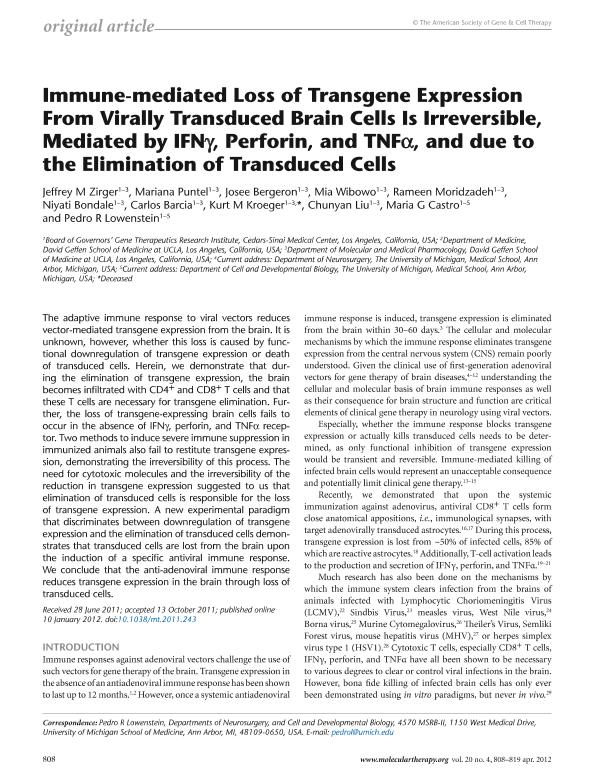Mostrar el registro sencillo del ítem
dc.contributor.author
Zirger, Jeffrey M.
dc.contributor.author
Puntel, Mariana

dc.contributor.author
Bergeron, Josee
dc.contributor.author
Wibowo, Mia
dc.contributor.author
Moridzadeh, Rameen
dc.contributor.author
Bondale, Niyati
dc.contributor.author
Barcia, Carlos
dc.contributor.author
Kroeger, Kurt M.
dc.contributor.author
Liu, Chunyan
dc.contributor.author
Castro, Maria Graciela

dc.contributor.author
Lowenstein, Pedro R.
dc.date.available
2020-03-26T20:48:56Z
dc.date.issued
2012-01
dc.identifier.citation
Zirger, Jeffrey M.; Puntel, Mariana; Bergeron, Josee; Wibowo, Mia; Moridzadeh, Rameen; et al.; Immune-mediated loss of transgene expression from virally transduced brain cells is irreversible, mediated by IFNγ, perforin, and TNFα, and due to the elimination of transduced cells; The American Society of Gene & Cell Therapy; Molecular Therapy (print); 20; 4; 1-2012; 808-819
dc.identifier.issn
1525-0016
dc.identifier.uri
http://hdl.handle.net/11336/101030
dc.description.abstract
The adaptive immune response to viral vectors reduces vector-mediated transgene expression from the brain. It is unknown, however, whether this loss is caused by functional downregulation of transgene expression or death of transduced cells. Herein, we demonstrate that during the elimination of transgene expression, the brain becomes infiltrated with CD4 and CD8 T cells and that these T cells are necessary for transgene elimination. Further, the loss of transgene-expressing brain cells fails to occur in the absence of IFNγ, perforin, and TNFα receptor. Two methods to induce severe immune suppression in immunized animals also fail to restitute transgene expression, demonstrating the irreversibility of this process. The need for cytotoxic molecules and the irreversibility of the reduction in transgene expression suggested to us that elimination of transduced cells is responsible for the loss of transgene expression. A new experimental paradigm that discriminates between downregulation of transgene expression and the elimination of transduced cells demonstrates that transduced cells are lost from the brain upon the induction of a specific antiviral immune response. We conclude that the anti-adenoviral immune response reduces transgene expression in the brain through loss of transduced cells
dc.format
application/pdf
dc.language.iso
eng
dc.publisher
The American Society of Gene & Cell Therapy
dc.rights
info:eu-repo/semantics/openAccess
dc.rights.uri
https://creativecommons.org/licenses/by-nc-nd/2.5/ar/
dc.subject
TRANSGENE EXPRESSION
dc.subject
VIRALLY TRANSDUCED BRAIN CELLS
dc.subject
IFN GAMMA
dc.subject
TNF ALPHA
dc.subject.classification
Neurociencias

dc.subject.classification
Medicina Básica

dc.subject.classification
CIENCIAS MÉDICAS Y DE LA SALUD

dc.title
Immune-mediated loss of transgene expression from virally transduced brain cells is irreversible, mediated by IFNγ, perforin, and TNFα, and due to the elimination of transduced cells
dc.type
info:eu-repo/semantics/article
dc.type
info:ar-repo/semantics/artículo
dc.type
info:eu-repo/semantics/publishedVersion
dc.date.updated
2020-02-07T13:37:41Z
dc.identifier.eissn
1525-0024
dc.journal.volume
20
dc.journal.number
4
dc.journal.pagination
808-819
dc.journal.pais
Estados Unidos

dc.journal.ciudad
Milwaukee
dc.description.fil
Fil: Zirger, Jeffrey M.. Cedars Sinai Medical Center; Estados Unidos. University of California at Los Angeles. School of Medicine; Estados Unidos
dc.description.fil
Fil: Puntel, Mariana. University of California at Los Angeles. School of Medicine; Estados Unidos. Cedars Sinai Medical Center; Estados Unidos. Consejo Nacional de Investigaciones Científicas y Técnicas; Argentina
dc.description.fil
Fil: Bergeron, Josee. Cedars Sinai Medical Center; Estados Unidos. University of California at Los Angeles. School of Medicine; Estados Unidos
dc.description.fil
Fil: Wibowo, Mia. University of California at Los Angeles. School of Medicine; Estados Unidos. Cedars Sinai Medical Center; Estados Unidos
dc.description.fil
Fil: Moridzadeh, Rameen. University of California at Los Angeles. School of Medicine; Estados Unidos. Cedars Sinai Medical Center; Estados Unidos
dc.description.fil
Fil: Bondale, Niyati. Cedars Sinai Medical Center; Estados Unidos. University of California at Los Angeles. School of Medicine; Estados Unidos
dc.description.fil
Fil: Barcia, Carlos. Cedars Sinai Medical Center; Estados Unidos. University of California at Los Angeles. School of Medicine; Estados Unidos
dc.description.fil
Fil: Kroeger, Kurt M.. University of California at Los Angeles. School of Medicine; Estados Unidos. Cedars Sinai Medical Center; Estados Unidos
dc.description.fil
Fil: Liu, Chunyan. University of California at Los Angeles. School of Medicine; Estados Unidos. Cedars Sinai Medical Center; Estados Unidos
dc.description.fil
Fil: Castro, Maria Graciela. University of California at Los Angeles. School of Medicine; Estados Unidos. Cedars Sinai Medical Center; Estados Unidos. University of Michigan; Estados Unidos
dc.description.fil
Fil: Lowenstein, Pedro R.. Cedars Sinai Medical Center; Estados Unidos. University of California at Los Angeles. School of Medicine; Estados Unidos. University of Michigan; Estados Unidos
dc.journal.title
Molecular Therapy (print)

dc.relation.alternativeid
info:eu-repo/semantics/altIdentifier/doi/http://dx.doi.org/10.1038/mt.2011.243
dc.relation.alternativeid
info:eu-repo/semantics/altIdentifier/url/https://www.sciencedirect.com/science/article/pii/S1525001616305457
Archivos asociados
